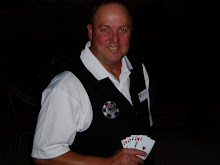| 1st | $56,861 |
| 2nd | $35,144 |
| 3rd | $23,022 |
| 4th | $15,937 |
| 5th | $11,623 |
| 6th | $8,907 |
| 7th | $7,156 |
| 8th | $6,017 |
| 9th | $5,281 |
Another consideration was brought up at the final table of yesterday's Senior's event. The numbers were smaller than the above example and a seven way chop was $4800. In an interesting twist, one player considered the tax effect. If you cash in a tournament for over $5000 the casino is required to report the winnings on a 1099-G and winnings from gambling are taxed at the rate of regular income. So for somebody in the 30% tax bracket, $4800 is $4800 but $5000 turns into $3500. Even $6000 is only $4200 net after taxes. Something to think about.
Another thing was what to do about the bubble. In the Senior's event 35 people get paid. When there are 36 people left in the tournament, the next player out is the bubble and gets no money. This means that people play very carefully (and slowly) at this point in the tournament. All tables play one hand and do not start the next hand until all tables complete the current hand - that way it can be more correctly determined who was the next player to bust. The problem it causes is that nobody wants to play as they all wait for the next person to burst the bubble and everybody remaining gets paid. To encourage people to play, all 36 players agreed to put ten bucks in for the "Bubble Boy". That way, the "Bubble Boy" had already busted and the player who busted 36th got the $360. The joke was, 35th place only paid $340. A player busted out 36th on the very next hand. :-)
The King of Hearts is known as "The Suicide King" because of the way he is depicted in most decks as having a sword in his head. His tendency to show up at the most morbid of times was never more evident than in a hand I dealt the other day where Pocket Aces were up against Pocket Kings. Both an ace and a king showed up on the Flop and when the odd card, a seven, paired on the Turn both players had Full Houses and all the money went in. The Suicide King appeared on the River to make Four-of-a-Kind Kings and knock the Aces Full owner out of the tournament. He was not happy. At least he got his money in with the best of it and he'll have a good story to tell when someone asks how he did in that big Poker tournament the other day.


No comments:
Post a Comment